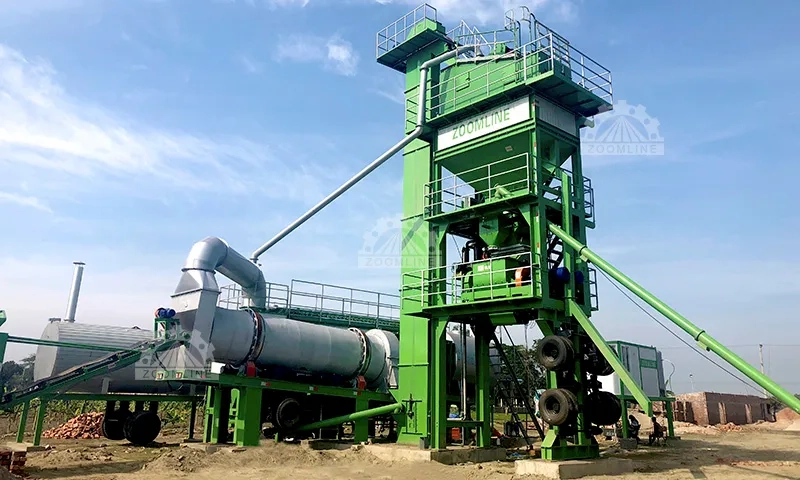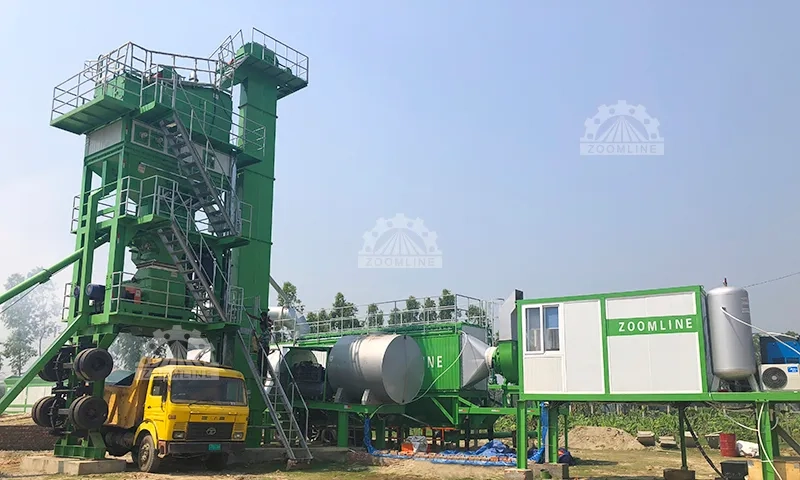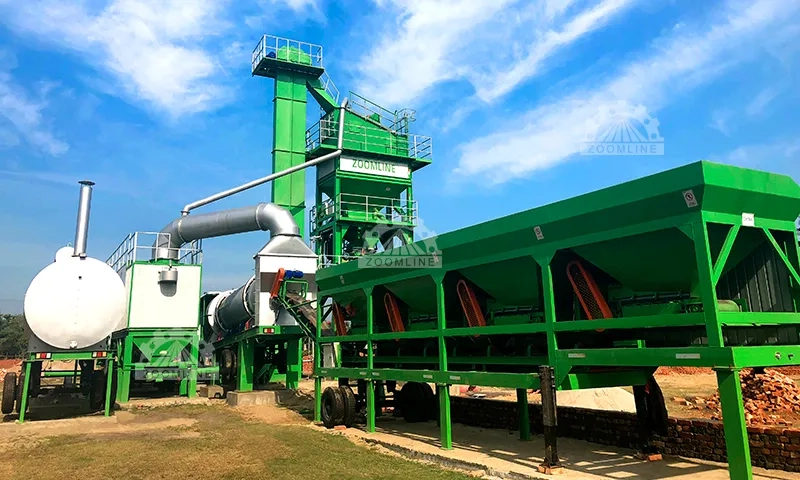In asphalt pavement construction, the asphalt mixing plant serves as the core equipment, with its operational status directly impacting mix quality, production efficiency, and construction safety. Proper preparation before use is crucial for ensuring personnel safety, enhancing efficiency, controlling costs, and guaranteeing project quality. It also forms the foundation for stable equipment operation and the advancement of pavement projects.
To properly prepare an asphalt mixing plant for operation, one must first gain a clear understanding of its structural components and common types. This enables targeted inspections and preparatory work.
An asphalt mixing plant is a complex integrated system where multiple key components work together to produce asphalt mixtures. The primary function of the aggregate bins is to store sand and stone aggregates of various specifications. Based on production requirements, these aggregates are conveyed via belts to subsequent stages in predetermined proportions. The drying drum heats and dries the aggregates to remove moisture, creating conditions for uniform mixing with asphalt. Its drying efficiency directly impacts the strength and stability of the asphalt mixture. The hot aggregate bin temporarily stores aggregates heated in the drying drum, facilitating precise batching according to the formula. The mixing drum serves as the core mixing chamber for asphalt mixtures, thoroughly blending hot aggregates, asphalt, mineral powder, and other raw materials in specified proportions to form compliant asphalt mixtures. Additionally, critical components such as asphalt storage tanks, mineral powder supply systems, dust collection systems, and control systems collectively ensure the smooth operation of the entire production process.
Based on production processes, asphalt mixing plants are primarily categorized into two types: batch mix plants and continuous mix plants. Batch mix plants operate by batch-feeding and batch-mixing materials. After completing one batch of mix production, they proceed to feed and mix the next batch. Their advantages include high batching accuracy, consistent mix quality, and the flexibility to adjust mix designs for different project requirements. They are suitable for projects demanding high-quality mixes, such as highways and bridges. Continuous mix plants continuously feed raw materials into the equipment for mixing. They offer high production efficiency and a relatively compact footprint. However, their batching precision and mix quality stability are slightly inferior to batch plants. They are better suited for projects with lower mix quality requirements that demand large-scale continuous production.
Understanding the components and types of asphalt mixing plants enables operators to develop more practical inspection and preparation plans during subsequent preparatory work, tailored to the functions of different components and the characteristics of various equipment types.

Pre-operation equipment inspection is the core preparatory step before using an asphalt mixing plant. Only by ensuring all components are in good working condition can malfunctions during production be avoided, safeguarding production safety and efficiency.
First, conduct a comprehensive visual inspection of the asphalt mixing plant’s mechanical equipment, focusing on signs of wear and aging. Examine conveyor belt surfaces for damage, cracks, and idler flexibility; inspect drying drum lining plates for wear or detachment; check mixing drum blades for deformation, wear, and clearance gaps with drum walls. Simultaneously, meticulously verify all bolts and nuts at equipment connection points—particularly on high-speed components like drying drums and mixing drums—to ensure no loosening, missing parts, or damage, preventing component detachment accidents during operation.
Lubrication is critical for ensuring normal equipment operation and extending service life. Before using the asphalt mixing plant, focus on inspecting the lubrication status of moving components such as bearings, gears, and chains: Confirm that grease is applied in sufficient quantity and of the correct specification. Check lubrication lines for blockages or leaks. Regularly replenish lubricants according to the equipment manual to ensure moving parts are adequately lubricated, reducing friction and wear to prevent equipment failures.
As the “nerve center” of the asphalt mixing plant, the electrical system’s operational status directly impacts equipment startup and operation. Comprehensive testing is required before use:
– Inspect electrical connections for tightness, loose joints, damage, or aging to ensure insulation integrity and prevent leakage or short circuits.
– Test control cabinet switches, buttons, indicator lights, PLC programs, and sensor signals. Verify that the grounding system meets standards and that grounding resistance complies with regulations to ensure electrical safety.
Safety equipment is critical for protecting lives and property, requiring a comprehensive check of its effectiveness. Firefighting equipment must be verified for quantity, type, expiration date, and pressure. Safety alarm devices must ensure sensitivity for temperature, pressure, liquid level, and other alarm functions. Emergency stop buttons must be tested to confirm they can rapidly cut power and halt operations, preventing accident escalation.
The quality of raw materials directly determines the quality of asphalt mix. Therefore, thorough preparation of raw materials before using the asphalt mixing plant is crucial.
Conduct rigorous quality inspections on aggregates, asphalt, mineral powder, and other raw materials. Aggregates must meet specifications for particle gradation, clay content, and other indicators, and be stored by grade. Asphalt should satisfy performance metrics such as penetration, with selection based on construction environment and project requirements. Mineral powder must be dry, clean, and comply with standards for fineness. Non-compliant raw materials are strictly prohibited from entering production to ensure qualified materials throughout the manufacturing process.
Aggregate particle size and uniformity directly impact the gradation, strength, and stability of asphalt mixtures. Strict screening must be conducted prior to use to ensure particle size compliance. Additionally, standardized aggregate storage management is required: harden stockpiles and improve drainage to prevent moisture accumulation and water-logging; store aggregates of different specifications separately with clear labeling to avoid misuse; implement dust control measures during storage to eliminate contamination.
Asphalt exists as a solid or semi-solid at ambient temperatures and must be heated to specified temperatures for mixing with aggregates. Heating must strictly control temperature and rate to prevent localized overheating, aging, and degradation. Simultaneously, ensure safe operation of heating equipment to prevent leaks that could cause fires.
In addition to aggregates and asphalt, raw materials such as mineral powder and additives must also be stored and protected properly. Mineral powder should be sealed in silos to prevent moisture absorption and caking. Additives should be stored according to their specific properties, avoiding exposure to light, high temperatures, and humidity. Implement protective measures throughout storage and handling to strictly prevent contamination and impurity ingress, ensuring consistent raw material quality.

To ensure the asphalt mixing plant produces asphalt mixtures meeting formula specifications, equipment calibration and appropriate production parameter settings are required prior to operation.
Precisely calibrate the batching system based on the engineered asphalt mix design. Fine-tune the feed rate of the aggregate bins, asphalt pump output, and mineral powder supply to ensure aggregate, asphalt, and mineral powder proportions meet design standards. Conduct multiple trial weighing and repeated verification adjustments to guarantee the asphalt mix gradation complies with requirements.
As the core of automated production, the control system requires comprehensive testing prior to operation. Conduct test batches to verify control accuracy throughout the entire process—including cold material conveyance and aggregate drying—ensuring compliance with time, temperature, and flow rate specifications. Simultaneously validate fault diagnosis functions to confirm rapid fault localization and protective activation during equipment malfunctions.
Temperature is a core factor affecting asphalt mixture quality. Before operation, precisely set the temperatures of the drying drum and mixing drum based on raw material characteristics and project requirements: adjust the former according to aggregate moisture content and drying needs to ensure proper drying while preventing aggregate degradation; set the latter according to asphalt grade and production standards to guarantee complete asphalt melting and uniform mixing with aggregates. During production, temperatures must be monitored in real time, with parameters dynamically adjusted to maintain temperatures within the appropriate range.
In today’s environmentally conscious climate, asphalt mixing plants must also prepare for environmental aspects prior to operation to minimize impacts on the surrounding environment and achieve green production.
Dust pollution is prone to occur during aggregate conveying and drying processes in asphalt mixing plant operations. Prior to operation, thoroughly inspect and optimize the dust collection system: ensure filter bags (or plates) in baghouse and electrostatic precipitators are clean and undamaged, fans operate normally, and pipelines are free of blockages or leaks. Install spray systems or dust hoods in high-dust areas such as aggregate stockpiles and conveyor transfer points to minimize dust emissions and protect local air quality.
Operational noise from asphalt mixing plants can disrupt the lives of nearby residents. Noise reduction measures must be implemented prior to operation: Install vibration dampers and soundproof enclosures on high-noise equipment such as drying drums and fans to minimize vibration and noise transmission. Strategically arrange equipment layout to position high-noise machinery away from residential areas. Install sound barriers around the mixing plant perimeter. Additionally, avoid conducting high-noise operations during residential quiet hours.
Asphalt mixing plants consume significant fuel in drying drums and heating equipment. Optimizing fuel usage reduces costs and pollution. Before operation, inspect and adjust the fuel system:
Check fuel nozzle cleanliness and atomization efficiency;
Adjust the fuel-air ratio to ensure complete combustion;
Set equipment parameters rationally based on production needs to avoid idling or overloading, thereby reducing energy consumption.
Asphalt mixing plants generate various wastes during production. This section focuses on core processing points, retaining key information on recycling, waste classification, and environmental measures while omitting specific examples to streamline content.
Asphalt mixing plant operations generate waste aggregates, asphalt residue, dust, and other byproducts. Prior to operation, establish a waste management plan to reuse recyclable materials. Non-recyclable waste must be sorted and disposed of according to environmental regulations. Implement environmental safeguards throughout the treatment process to prevent pollution and secondary impacts.
Operators are the direct executors of asphalt mixing plant operations. Their operational skills and safety awareness directly impact equipment operational safety and production efficiency. Prior to use, thorough operator training and implementation of safety procedures must be completed.
Conduct systematic training for asphalt mixing plant operators covering core topics such as equipment structure and principles, operational procedures, and troubleshooting. Employ a combination of theoretical instruction and hands-on practice to enhance operational skills. Simultaneously reinforce safety knowledge education to equip operators with risk response and emergency handling methods. Strictly enforce assessment systems to ensure certification before assignment.
Organize operators to thoroughly study the asphalt mixing plant’s safety operating procedures and emergency response plans. Clearly define safety protocols for the entire equipment startup and shutdown process, including mandatory pre-startup inspections and real-time monitoring for anomalies during operation with immediate shutdown if detected. Strengthen emergency training to ensure personnel are proficient in alarm procedures, evacuation protocols, and the use of firefighting equipment during emergencies such as fires or electric shocks. Through regular safety education and emergency drills, enhance personnel safety awareness and emergency response capabilities to reduce accident risks and losses.
Operators are equipped with complete, certified personal protective equipment (PPE), and their proper usage is supervised. PPE includes essential items like hard hats, safety harnesses, and dust masks, precisely configured based on job requirements—dust masks for dust-prone roles, safety harnesses and hard hats for elevated work. Equipment is regularly inspected, with damaged or expired items promptly replaced to reinforce safety defenses.

The operation of asphalt mixing plants must comply with relevant national and local laws, regulations, standards, and specifications. Conduct compliance inspections prior to use to ensure lawful and compliant equipment operation.
Strictly adhere to environmental protection, safety, land use, and other regulatory policies. Focus on implementing environmental standards for dust, noise, and exhaust emissions from asphalt mixing plants, equipment safety operation norms, and land policy requirements for site selection and construction. Before use, comprehensively verify the construction, equipment configuration, and environmental protection measures of the mixing plant to eliminate non-compliance risks.
Verify the validity of required permits and certification documents for the asphalt mixing plant. Prioritize verifying that business licenses, environmental impact assessment approvals, pollution discharge permits, and work safety permits are current and have passed annual inspections. Confirm that technical documentation—including equipment product certificates and inspection reports—is complete and meets quality standards. For equipment requiring periodic testing (e.g., measuring instruments, environmental protection devices), ensure all certifications are valid and current to guarantee lawful plant operations.
After completing the aforementioned preparatory work, further validation of the asphalt mixing plant’s operational status and production capacity must be conducted through trial runs and quality inspections to ensure the production of asphalt mixtures meeting quality requirements.
Prior to formal production, organize trial operations for the asphalt mixing plant. Conduct multiple batches of trial production following the production process. During this period, closely monitor equipment startup performance, operational stability, and component coordination. Inspect whether raw material conveyance, heating, batching, and mixing processes proceed smoothly, verify the accuracy of control parameters, and observe the mixture’s appearance for issues such as color inconsistency, streaky material, or segregation. Identify and rectify equipment issues promptly through trial operations to ensure the plant reaches normal production status.
Conduct quality testing on the asphalt mixture produced during trial operation, focusing on core indicators such as gradation and Marshall stability to verify compliance with project and specification requirements. If test results fail to meet standards, promptly adjust batching and temperature parameters, then retest the mixture until compliance is achieved. Simultaneously, establish a quality control system to perform regular sampling inspections during formal production, ensuring consistent quality.
Preparatory work prior to asphalt mixing plant operation constitutes a systematic and meticulous task encompassing equipment inspection, material preparation, calibration settings, environmental considerations, personnel training, compliance checks, and testing verification. Each step is critical and indispensable. Only through thorough, detailed, and substantive execution of all preparatory tasks can the effective operation of the asphalt mixing plant be ensured.